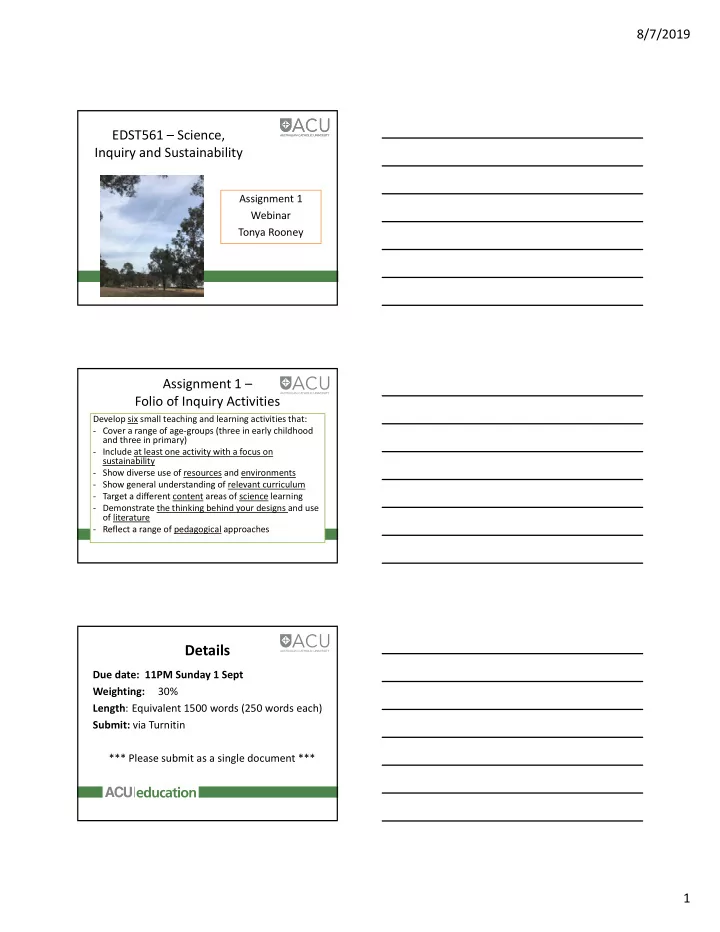

8/7/2019 EDST561 – Science, Inquiry and Sustainability Assignment 1 Webinar Tonya Rooney Assignment 1 – Folio of Inquiry Activities Develop six small teaching and learning activities that: ‐ Cover a range of age‐groups (three in early childhood and three in primary) ‐ Include at least one activity with a focus on sustainability ‐ Show diverse use of resources and environments ‐ Show general understanding of relevant curriculum ‐ Target a different content areas of science learning ‐ Demonstrate the thinking behind your designs and use of literature ‐ Reflect a range of pedagogical approaches Details Due date: 11PM Sunday 1 Sept Weighting: 30% Length : Equivalent 1500 words (250 words each) Submit: via Turnitin *** Please submit as a single document *** 1
8/7/2019 Note on word count The word count does not include: • Your reference list at end of each activity. • The words already in the template (if you chose to use this) • Any diagrams or images you might to include. You could add appendices (e.g. an example of a resource if relevant). These also do not count as part of the word limit. Do not go outside the word limit by more than +/‐ 10% Criteria • Ability to develop a variety of age‐appropriate science‐related activities with due consideration to the diverse learning environments, resournces and relevant curriculum framework/s (5/30 marks) • Explanation for each activity demonstrates capacity to draw on findings from research to inform practice and pedagogy (10/30 marks) • Planning reflects use of diverse pedagogies such as exploratory, play and inquiry based learning, and includes at least one activity that supports children to investigate their relation to, and impact on, society and the environment with reference to sustainability (10/30 marks) • Academic skills – writing and referencing (5/30 marks) Using the template • It is a guide only. You can add to or alter the template. • Look at the rubric and the weighting of the criteria as well. Take this into account when deciding which aspects to focus on in more depth. 2
8/7/2019 Diverse resources and learning environments • This content will be covered in Weeks 3 and 4 (and available on LEO by the end of Week 2) • The aim is to think about the significance of resources and spaces as part of the learning activity. • The resource or learning environment does not necessarily have to be the main focus of your learning activity, but it needs to be important to the design of the activity and the learning. • For example, if you were to design an activity on ‘How wetlands work’ – this would look very different if you did this (a) using a digital app on wetlands, (b) went on an excursion to a wetland, or (c) constructed your own wetland out of recycled materials. These would all constitute good learning activities, but the design and learning environment you decide on allows the learning to happen in different ways. • In a similar way, the types of resources you choose to support an activity will make a different. • Across your six activities, try to show as much diversity as possible. Other points … • For the purpose of this assignment, a template is available to guide you • You can add other features such as questions or provocations for children as a teaching strategy • There is no time limit for the activity (ie if implemented) – it could be for 10 minutes as part of a lesson or a whole day or longer. • Consider how you will promote science learning and remember to have one that is about sustainability. And a couple more points … When you reference the EYLF or the Australian Curriculum, try to be as specific as possible (i.e. the broad and specific smaller parts). • Note: It is not important how many links to the curriculum framework you include, but rather how relevant and embedded they are in your activity. 3
8/7/2019 Information on pedagogical approaches to science learning • Your textbook/s provides a good starting point • The Educators’ Guide to the EYLF and the AITSL website may also be useful. • Additional references on LEO are another place you can start from Referencing • Be familiar with the ACU Academic integrity policy ‐ You can access this via the ‘referencing’ quick link on the Library home page. • Advice on APA referencing is available via the Academic Skills Unit LEO page – There are many resources including a video. What constitutes a quality academic source? • Peer‐reviewed journal articles • Scholarly books by academics • Some text books – though they are often secondary source material, and better used as a starting point to find other materials • Online articles may be acceptable – find ones by academics. • If using a news outlet such as The Conversation – once again, take this as a starting point to find the research it refers to. 4
8/7/2019 If you have questions: Post them to the Questions for the Lecturer forum. Check over these slides to make sure your question hasn’t already been addressed. (or email me if your query is not resolved by any of the above!). 5
Recommend
More recommend